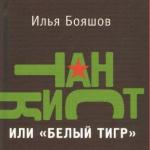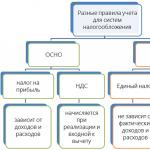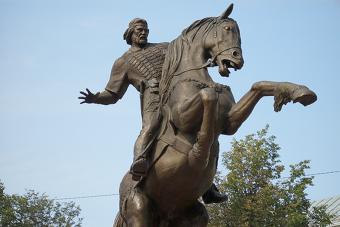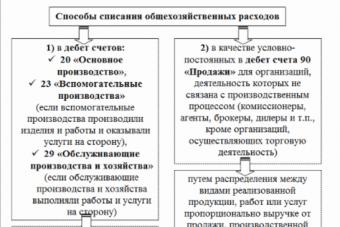Ekaterina Shulman - political scientist, candidate of political sciences, lecturer at the Russian Academy public service and the national economy, an expert on the problems of lawmaking, a regular columnist for the newspaper "Vedomosti", the author of the book "Lawmaking as political process»And the author of many other electronic and printed publications.
A series: Professional book
* * *
company liters.
© Ekaterina Shulman, 2015
© Sergey Yolkin, cover design, 2015
Editor Victoria Stepanets
Editor Igor Alekseev
Editor Ekaterina Plyonkina
Editor Anna Rudyak
Editor Natalia Saliy
Created in the intellectual publishing system Ridero.ru
Ekaterina Shulman is a political scientist, teacher, specialist in lawmaking, a regular columnist for the Vedomosti newspaper and the author of many other electronic and printed publications, the author of the book Lawmaking as a Political Process. The new collection presents her best articles of 2013-15 under one cover, which tell about the peculiarities of the Russian political system, its properties, qualities and transformation prospects.
"Practical Political Science: A Guide to Contact with Reality" is a book in which the author aims to describe the Russian political system outside the false dichotomy of "dry theory" and "homespun truth" scientific knowledge, practical experience and common sense.
From the book you will learn:
- what political regimes does the Russian one resemble and what this says about its probable future;
- what stands between democracy and autocracy;
- what do “hybrid” regimes look like and can Russia be attributed to them;
- what the legislative process in Russia actually looks like - where do the new laws come from, who are their real authors and beneficiaries.
Olga Romanova, journalist, head of the Charitable Foundation for Aid to Convicts: “Here is a book that should be read. Not reverently, but with a marker or pencil, leaving polemical notes in the margins and highlighting in pink special places... Moreover, Ekaterina Shulman is becoming more and more interesting and famous every day to such an extent that soon, God forbid, she will be labeled "popular author". Not only does she have a brilliant command of the syllable and writes exceptionally well. She has some kind of rare charm and a clear mind, which cannot but annoy. And this is the main thing in books - to make you think a little differently about yourself, your beloved, about reality and the fantasy surrounding us "
Boris Grozovsky, economic commentator: “Ekaterina Shulman is perhaps the only political scientist involved in Russia who combines intellectual honesty and philological grace with inexhaustible optimism. How she does it is a mystery. Probably a matter of common sense (he does not give preference to simple explanations excessively complex) and the ability to look at the political process, including two optics at the same time: active observation from close range and a dispassionate look through a telescope at the political games of incomprehensible aliens, whose motives we can only guess "
Gleb Morev, journalist, editor-in-chief of the Literatura department of the Colta.ru website: “In Russian intellectual prose, nothing is as scarce as the type of author's strategy, precisely defined in the early 1930s by Viktor Shklovsky as“ the search for optimism ”. And here, developing the second metaphor of Shklovsky, Ekaterina Shulman, with her shrewdly ironic view of today's Russia, is an undoubted champion, according to the Hamburg account. "
* * *
The given introductory fragment of the book Practical political science. A guide to contact with reality (Ekaterina Shulman) provided by our book partner -
© Ekaterina Shulman, text
© Sergey Elkin, cover illustration, endpapers
© AST Publishing House LLC
No part of this edition may not be reproduced or used in any form, including electronic, photocopying, magnetic recording or any other means of storing and reproducing information, without the prior written permission of the copyright holder.
From the book you will learn
- what political regimes does the Russian one resemble and what this says about its probable future;
- what stands between democracy and autocracy, what is the weakness and strength of hybrid regimes, and how you can use this knowledge to your advantage;
- how the lawmaking process in Russia actually looks like: where do the new laws come from, who are their real authors and beneficiaries, and how to fix an enraged printer;
- what transformations are taking place in Russian society, and what political consequences this will lead to;
- how a citizen can influence decisions affecting his interests and stay alive.
Practical Nostradamus
or 12 mental habits that prevent us from predicting the future
The traditional genre of late December is fortune-telling and prediction, but the tumultuous 2014 increased the demand for this genre almost more than for cash. In the era social networks political forecasting is no longer the prerogative of the political scientist class (whoever they are), but is available to everyone who has the Internet. Over the past year, we have heard a lot of various prophecies, and few of us resisted the temptation to be Vanga and predict famine, pestilence, war and the end of the world. However, the prophetic genre has its dangers: the horizon of the future is obscured by prejudice, superstition and the usual course of human stupidity. These are the main mistakes to avoid when writing prophecies.
1. Personification. If you were smart enough to at least register an account on a social network, then you can no longer be warned against primitive forms of fixation on the role of a person in a story like "If there is no citizen X, there will be no Russia either." You already guess that Russia will outlive both citizen X and Y, and you and me. Even a political regime should not be associated with a specific person: a person may disappear, a regime may persist (or vice versa). A political system is a complex organism, and reducing it to one person is a dangerous mental aberration. Try to avoid speculations about resignations and appointments: if you were told "100% info", then the informant, most likely, was driven not by love of truth, but by hardware calculations. Strive to rise to the next level of generalization, and not engage in court political science, which always smacks of lackey.
2. Historical parallels. It is time to stop taking literally Marx's joke on Hegel: history does not repeat itself either as a tragedy or as a farce. Since the number historical facts infinitely, there is a high probability that the extreme similarity of the past to the present is based either on the magic of numbers (1914/2014), or on highlighting some phenomena and ignoring others.
But the main sin of parallelism is not even that it is the most easy way demonstrate their historical illiteracy, but that this kind of thinking denies progress. Fans of the theory of eternal return live in a motionless world, where the surrounding enemies eternally restrain the eternally reborn Russia and no one will ever defeat anyone and agree with anyone: this is how the world works. This type of consciousness is characteristic of the Middle Ages with its idea of the wheel of fortune: nothing changes, everything repeats itself. This is how the people of the agrarian society thought. Peasant labor was built on cycles, experience in it was more important than innovation, and progress did not exist. The great geographical discoveries and the industrial revolution tore apart the rounded and closed world of the Middle Ages, replacing the wheel with a road of progress going into the future. There was a lot of charm in the traditional picture of the world, but there is no return to it.
3. Geographic cretinism. This point follows from the previous one: the same people who deny time deify space. Change of eras does not exist for them, but geography is destiny. Comparing, say, the Russian political regime with the Venezuelan one seems to them offensive: how can our mighty homeland be equated with Latin Americans? But the comparison of today's Russia with the Russia of Ivan the Terrible, which has nothing in common with it, either economically, culturally or socially, seems to them to be quite adequate. Meanwhile, historical time flows for everyone, and the fate of the country is not fixed by its geography: the future is determined to a greater extent by the level of development of citizens and public institutions. Therefore, related political regimes at different ends of the earth behave in a similar way, and in the life of the southern and North Koreans there is nothing in common.
4. Vulgar materialism. From the fetishization of the territory, the worship of "resources" logically follows, which is usually understood as God-given hydrocarbons, which completely determine the life of the space under which they lie. Graduates of Soviet schools are particularly prone to linear understanding of economic determinism. Praying for the price of a barrel of Urals is equally characteristic of the regime's pillars and opponents awaiting its demise. Yes, the worsening economic environment narrows the resource base through which the regime buys loyalty. But how he will act in these conditions depends to a large extent on his internal institutions and foreign policy environment.
5. Vulgar idealism. As you expect power to make certain decisions or statements, remember that it does not exist in the Platonic universe, where the idea immediately becomes reality. Avoid talking about the mythical "political will", in the presence of which everything is possible: the higher a person stands in a political system, the more he is bound by the conditions of this system - and not vice versa, as is often thought. In our country, the presidential control and auditing department is engaged in calculating the level of compliance with presidential decrees - even in well-fed years it rarely exceeded 70%, while decrees in our legal system deal with very specific issues. How fulfilled federal laws- it is generally difficult to calculate.
6. Reverse cargo cult. The cargo cult is the belief that making models of airplanes from manure and straw will attract the real ones, who will bring a lot of stew. The reverse cargo-cult is characteristic of the countries of catching-up development, it is especially adhered to by their political elites. They preach that in the First World, planes are also made of straw and manure, but there is no stew. Only there they pretend more dexterously and hide this fact. When you are told again about the futility of bourgeois elections, parliamentary comedy and police violence, remember: airplanes exist and people fly on them. Economic competition, free elections and an independent court are also real.
7. Catastrophism. All writers love dramatic effects, but you should not base your forecast on literary models, so that in the end everyone will certainly die or get married. Having identified a certain factor in the surrounding reality, do not stretch it to infinity along an ideal plane.
In the same reality, there are myriad other factors at work that you have not considered. The historical process never ends - even Fukuyama miscalculated with his "End of History", and you will be all the more disgraced with the prophecy of the collapse of Russia by the New Year. Before predicting the collapse, death or the end of anything, take into account the force of inertia, the instinct of self-preservation, which is characteristic not only of people, but also of systems, as well as the fact that, according to the English proverb, the mills of God grind finely, but very slowly. If you really want to be Cassandra, follow the classic patterns: be short, sinister, and inaudible. By crossing the river, you will destroy the great kingdom. Two troops will join the battle, but only one of them will win.
8. Conspiracy. Conspiracy theories of any complexity are built on one basic premise: there are hidden springs of events that can be exposed by a cunning juxtaposition of individual facts. But does anyone remember a case when a secret would be revealed, unknown to contemporaries, which turned our ideas about how it all (no matter what) really was? Alas, minus the insider details that seem important only at close range, all significant historical processes are in fact exactly what they seemed to people who lived at that time. Everything secret not only becomes apparent; it is also doomed to be insignificant, because everything important lies on the surface and is observable with the naked eye. The world is not ruled by secret organizations (Jesuits, Templars, wise men of Zion), the world is ruled by explicit organizations - governments, parliaments, the army, the church, commercial corporations. Successful conspiracy does not change the course of history, but is a set of efforts to organize the sunrise by hand.
9. External control. The picture of the world, in which no country controls its own affairs, but each controls the affairs of a neighbor, is one of the varieties of conspiracy theories. Only the place of underground governments is taken by external enemies - also disguised, so that the general atmosphere of dark secrets, dear to the heart of the conspiracy theorist, remains. Whether the exchange rate of the national currency changes, social activity grows or falls, young people begin to wear pants of a new style, the writer publishes a novel - the reasons for this are always not in society, but outside it. The trouble is that although outsourcing of political responsibility abroad is good way to expose himself to be innocent, it deprives the country of its subjectivity. This is especially absurd in the case of Russia, a large country with a large, predominantly urban and literate population.
10. Fantasies about China. Whether you are talking about the Chinese threat or Chinese aid, remember that we really don't know much about this country, and a large part of our imaginations are attempts by the European mind to imagine the Other. In many near-political discourses, China is as a symbol of a certain chthonic threat, a faceless multitude that will rush in and kill (or, in a recent version, endow with untold wealth). Demographers say that the desire of the Chinese to populate the empty Eastern Siberia is a publicistic myth. China is now going through the same process that all the industrial powers went through in their time - urbanization. The Chinese do not want to live in the vastness of Eastern Siberia, they want to live in their large cities, where they leave in droves.
11. Quotes from the greats. No officials have ever claimed that Russia is unfairly owning Siberia. Margaret Thatcher did not say that 15 million people should remain in Russia. Bismarck did not claim that in order to destroy Russia, it was necessary to embroil it with Ukraine. Check the sources! Much of the quotes from the great people surfing the internet are penned by the marginal patriotic press of the 1990s and popularized by the wild TV presenters of the 2010s. Stolypin, Reagan, Churchill, Margaret Thatcher, Madeleine Albright, Goebbels, Nietzsche, Oscar Wilde and all the Romanovs are especially affected. Remember, what is not in the Oxford Dictionary of Quotations does not exist. For Russian-language quotes, you can go to Wikipedia, but you still have to double-check.
12. Conversations with the people. Do not retell your conversations about the external and domestic policy with a taxi driver, nanny and repair worker. All people tend to consider themselves unique creatures, and those around them - typical. If your opinions are the result of your individual thought process, then why then the taxi driver, talking about the war with Ukraine, speaks on behalf of all " ordinary people»An inhabited universe? Remember, no man considers himself simple. Recognize that the janitor and the shop assistant have the right to be as much a combination of personal experience, knowledge, prejudice and mental disability as you are.
Dear grandfather Nostradamus! Bring us all in the new year of clear reason, rational thinking, freedom from superstition and an objective view of yourself and others. Let false wisdom flicker and smolder before the sun of the immortal mind. Then no future is scary.
Hybrid Authoritarianism: Anatomy and Physiology
Hybrid modes: the realm of imitation
on the essence of hybrid political regimes as a modern modification of authoritarianism
Recently, the new Hungarian Prime Minister Viktor Orban delighted the scientific world by declaring that it would be good to build an illiberal democracy in Hungary in the Russian manner, otherwise the liberal model has somehow exhausted itself. At the same time, he quite shrewdly noted that “the most popular topic of thinking now is how systems work that are not Western, liberal or liberal democracies". Indeed, there is nothing more relevant in modern political science than the study of hybrid regimes. There are many terms for them, which reflects the unsettled nature of the subject of research: illiberal democracies, imitation democracies, electoral authoritarianism, non-tyrannical autocracy.
What benefits can this cutting edge science give to practice? It is important to understand the nature of hybrid regimes in order to avoid intrusive historical analogies and wasting time waiting for fascism or the dawn of Soviet power to come outside the window. Historical pessimism is always in vogue - it is believed that the main lesson of the twentieth century is that at any moment everything can be worse than it was, and no degree of civilization prevents a sudden attack of savagery. But “worse” and “better” are evaluative terms, and popular arguments about the bottom at which they knocked and other chronicles of the coming apocalypse sound convincing, but there is no more rational basis under them than in the custom of spitting over the left shoulder and fear of the evil eye. To make decisions on such a basis is no less reckless than to be guided by the optimistic principle “maybe it will blow by”.
1. The hybrid regime is authoritarianism on the new historical stage... It is known what the difference is between authoritarian and totalitarian regimes: an authoritarian regime encourages passivity in citizens, a totalitarian regime encourages mobilization. A totalitarian regime requires participation: whoever does not march or sing is disloyal. The authoritarian regime persuades its subjects to stay at home using various methods: whoever marches too cheerfully and sings too loudly is on suspicion, regardless of the ideological content of the songs and the direction of the marches.
2. Hybrid regimes are established mainly in resource countries, sometimes called petrostates (although the life-sustaining resource is not necessarily oil). That is, these are regimes that get money for nothing, and not from people's labor, but from a natural resource. The population only hinders them and creates additional risks for the cherished dream of the hybrid regime - irremovability. At the heart of the regime is the very idea that for some reason is attributed in Russia to Margaret Thatcher - it would be good to have X citizens to service the pipe (well, mine), and the rest would go somewhere. For this reason, the regime is wary of any mobilization - it does not have any institutions using civic engagement and civic participation.
3. Western researchers, who have called the hybrid regime illiberal democracy or electoral authoritarianism, pay attention to one side of it - the decorativeness of its democratic institutions. In hybrid regimes, elections are held, but the government does not change as a result, there are several TV channels, but they all say the same thing, there is opposition, but it does not oppose anyone. So, Western political scientists say, this is all decorative tinsel, under which what is hidden? Good old authoritarianism. In fact, the hybrid regime is imitative in two directions: it not only simulates democracy, which does not exist, but also depicts a dictatorship that also does not exist in reality. It is easy to see that the democratic façade is made of papier-mâché - it is more difficult to understand that Stalin's mustache is also false. It is also difficult because for modern man“Pinpoint violence” and “low level of repression” are morally questionable terms. We live in a humanistic era, we are horrified by human sacrifices, which are insignificant according to European concepts of the 20th century.
4. The hybrid regime is trying to solve its main task - to ensure the irremovability of power - with a relatively low level of violence. He has neither the moral capital of the monarchy nor the repressive machine of totalitarianism at his disposal. You cannot deploy what is called the flywheel of repression without active participation citizens - and citizens of hybrid regimes do not want to participate in anything. It is characteristic that state propaganda in hybrid regimes does not provide a mobilizing effect. It unites citizens according to the principle of passivity. Look at Russia's 87%, who approve of everything from military incursions to food sanctions. When asked "do you approve?" they answer "yes" - and what are they doing? Nothing. They do not enroll in volunteer battalions, do not go to pro-war rallies, they do not even go to elections especially, which is why the hybrid regime has to endlessly worry about false turnout and falsification of results. Of the politically motivated activities, they were only seen taking money from bank accounts and converting them into dollars, as well as purchasing butter... Propaganda with dizzying effectiveness forms the opinion of precisely those people whose opinion does not matter - not because they are some bad second-rate people, but because their opinions do not correlate in any way with their actions. They can provide the authorities with approval, but not support - they cannot be relied on.
5. The regime understands with its reptilian brain (that in this case it is not a curse, but a neurophysiological term - the reptilian brain is responsible for our actions in case of danger) that 87% of those who approve are not subjects of the political process, and the only ones whose opinion matters is active minority. This explains the “lawmaker's paradox” - why the government, which has seemingly united nationwide support, does not in any way enjoy this support, but adopts more and more laws of repressive and defensive content. The adopted laws are aimed at finding this active minority - perhaps they have a second citizenship? or are they somehow connected with public organizations? or are they bloggers? go to rallies? or do they even like to smoke in restaurants? How to grope and strangle them - not too much, but slightly - or even better to convince them that they are insignificant renegades, and it would be good for them to leave. The hybrid regime never restrains its citizens - on the contrary, it encourages an active minority to leave.
6. Hybrid regimes are quite stable and tenacious - they take advantage of an almost market economy and a partially free social environment, and therefore do not fall apart in the morning like classical dictatorships. This should be taken into account both awaiting a remake of the collapse of the USSR, and awaiting its sudden revival. In the sixteenth year of his reign, hitting the floor and turning into a gallant fascist is as difficult as killing himself against the wall and being reborn as a radiant liberal. It does not follow, however, that the hybrid regime is stable: it longs for stability, and for the sake of it is ready for any upheavals. The root of this seeming contradiction lies in the decision-making mechanism - the bone needle of the hybrid regime. Sequentially cutting off and clogging all channels with debris feedback, the regime is forced to act largely by touch. To connect with reality, he is left with a TV that talks to itself, elites specially selected according to the principle of incompetence, and the inner feeling of a leader, whose heart should be something to your rhythm. Therefore, the regime constantly guesses which of its actions or inaction will be acceptable for the external and internal audiences - and when it makes a mistake (assuming, for example, that from step X there will be a "loss of face", and from step Y, on the contrary, there will be no bad consequences), then no he has no leverage to correct the error. The hybrid mode does not have a reverse gear - it is stable, but not maneuverable.
7. It should be understood that the very emergence of imitation democracies is not the result of damage to non-imitation democracies, but the fruit of the progress of morals, which no longer allows the use of violence as widely and carelessly as was customary fifty years ago. If "hypocrisy is a tribute that vice pays to virtue," then imitation is a tax that a dictatorship pays to democracy.
Practical Political Science: A Guide to Contacting Reality
Ekaterina Shulman is a political scientist, teacher, specialist in lawmaking, a regular columnist for the Vedomosti newspaper and the author of many other electronic and printed publications, the author of the book Lawmaking as a Political Process. The new collection presents her best articles of 2013–15 under one cover, which tell about the peculiarities of the Russian political system, its properties, qualities and prospects of transformation.
"Practical Political Science: A Guide to Contact with Reality" is a book in which the author aims to describe the Russian political system outside the false dichotomy of "dry theory" and "homespun truth", but using methods of scientific knowledge, practical experience and common sense.
From the book you will learn:
- what political regimes does the Russian one resemble and what this says about its probable future;
- what stands between democracy and autocracy;
- what do “hybrid” regimes look like and can Russia be attributed to them;
- what the legislative process in Russia actually looks like - where do the new laws come from, who are their real authors and beneficiaries.
Olga Romanova, journalist, head of the Charitable Foundation for Aid to Convicts: “Here is a book that should be read. Not reverently, but with a marker or pencil, leaving polemical notes in the margins and highlighting special places in pink. Moreover, Ekaterina Shulman is becoming more and more interesting and famous every day to such an extent that soon, God forbid, she will be labeled "popular author". Not only does she have a brilliant command of the syllable and writes exceptionally well. She has some kind of rare charm and a clear mind, which cannot but annoy. And this is the main thing in books - to make you think a little differently about yourself, your beloved, about reality and the fantasy surrounding us "
Boris Grozovsky, economic commentator: “Ekaterina Shulman is perhaps the only political scientist involved in Russia who combines intellectual honesty and philological grace with inexhaustible optimism. How she does it is a mystery. Probably, the matter is in common sense (he does not give preference to simple explanations of excessively complex) and the ability to look at the political process, including two optics at the same time: active observation from close range and a dispassionate look through a telescope at the political games of incomprehensible aliens, about whose motives we can only guess"
Gleb Morev, journalist, chief editor of the Literatura department of the Colta.ru website: “In Russian intellectual prose, nothing is as scarce as the type of author's strategy, precisely defined in the early 1930s by Viktor Shklovsky as“ the search for optimism ”. And here, developing the second metaphor of Shklovsky, Ekaterina Shulman, with her shrewdly ironic look at today's Russia, is undoubted, according to the Hamburg account, a champion. "
Foreword by Gleb Pavlovsky
Life of hybrids
The life of our political science could form a satire genre in the spirit of A. Zinoviev, whether it was in demand. But strict Ekaterina Shulman will not joke with science. The book is ruled by a healthy non-publicistic ruthlessness - the author is fighting for the scientific honor of the subject.
Practical Political Science: A Guide to Contacting Reality
(No ratings yet)
 Title: Practical Political Science: A Guide to Contact with Reality
Title: Practical Political Science: A Guide to Contact with Reality
About the book Ekaterina Shulman "Practical Political Science: A Guide to Contact with Reality"
The new collection under one cover presents the best articles by Ekaterina Shulman of 2013-15, which tells about the peculiarities of the Russian political system, its qualities and prospects for transformation. "Practical Political Science: A Guide to Contact with Reality" is a book in which the author aims to describe the Russian political system outside the false dichotomy of "dry theory" and "homely truth", but using methods of scientific knowledge, practical experience and common sense.
On our site about books, you can download the site for free without registration or read online book Ekaterina Shulman "Practical Political Science: A Guide to Contacting Reality" in epub, fb2, txt, rtf, pdf formats for iPad, iPhone, Android and Kindle. The book will give you a lot of pleasant moments and real pleasure from reading. Buy full version you can contact our partner. Also, here you will find latest news from the literary world, learn the biography of your favorite authors.
For aspiring writers, there is a separate section with useful tips and recommendations, interesting articles, thanks to which you yourself can try your hand at literary skills.
Free download of the book by Ekaterina Shulman "Practical Political Science: A Guide to Contact with Reality"
In the format fb2: Download
In the format rtf:





